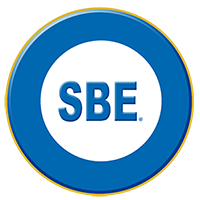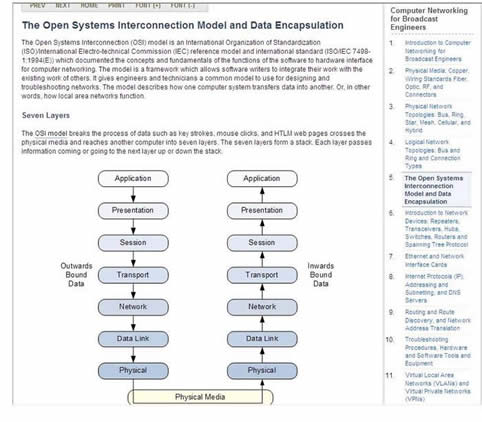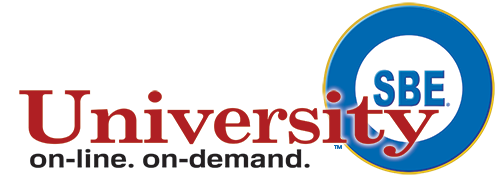Online, on-demand courses on a variety of broadcast technical topics
Developed by experts for the SBE
With these online self-study courses, you pick the date, time and location to learn. Now that’s convenience! Once you register for the course, you immediately receive a link to the course where you can access it again and again as your schedule permits.
Each course in SBE University is an electronic book that typically includes 8-14 chapters. At the end of most chapters are quizzes, as well as a final exam at the end, all to help you confirm your knowledge of the material. One great thing about this Internet-based program is that it keeps track of where you have been in course, including noting the last chapter you viewed. In addition, the program keeps track of the chapters you completed, even if you skipped around.
Courses
Adaptive Media SystemsEngineering
Author: Philip Cianci, CSTE, CBNT
SBE Members: $90; Non-Members: $135; SBE MemberPlus Members: Free
This course addresses the challenges of a contemporary technologist who works in the broadcast or media industry and offers techniques to ease the transition from broadcast engineer to media systems engineer. Each chapter provides practical suggestions and solutions for the digital era. Subjects include an introduction to media systems engineering, the role of the media systems engineer, the importance of professional societies and standards bodies, project management techniques, the planning process, process improvement, organizational efficiency and more.
“The author uses lots of industry standards and relates them very well to the broadcast industry. This is a thought provoking course that guides the project engineer to new methods of managing the unmanageable task of today’s broadcast IT-centric projects.”
— Paul Claxton, CPBE, CBNE; course reviewer
AM Antenna Computer Modeling
Author: Cris Alexander, CPBE, AMD, DRB
SBE Members: $90; Non-Members: $135; SBE MemberPlus Members: Free
The FCC now permits moment method computer modeling of many AM directional arrays as an alternative to traditional cut-and-try adjustments and field strength measurements as a means of performance verification (“proof”). This alternative has the potential in many cases of saving a tremendous amount of time and expense, allowing the licensee of an AM station using a directional antenna to tune up and proof the antenna system for a fixed and greatly reduced cost.
It should be noted that this is not an omnibus method moment modeling training course. It does assume a basic understanding of modeling techniques and procedures.
Introduction to AM Antenna Systems
Author: Cris Alexander, CPBE, AMD, DRB
SBE Members: $90; Non-Members: $135; SBE MemberPlus Members: Free
This course takes the student through every facet of AM antenna systems in all their forms, dealing with each element or variation separately and pulling the elements together to show how they are used in concert.
Introduction to Broadcast Audio Processing
Author: Stephen M. Poole, CBRE, AMD, CBNT
SBE Members: $90; Non-Members: $135; SBE MemberPlus Members: Free
This course, intended for the intermediate-to-experienced broadcast engineer, takes a practical, real-world approach to audio processing. Topics include loudness and the human ear, gain control, limiting and clipping, adjusting a wideband processor for voice and multi-band processing.
Introduction to Computer Networking for Broadcast Engineers
Author: Paul Claxton, CPBE, CBNE
SBE Members: $90; Non-Members: $135; SBE MemberPlus Members: Free
The purpose of this course is to give the student an introduction to the fundamental concepts of computer networking. This course will assist the broadcaster in passing the SBE Certified Broadcast Networking Technologist exam.
Introduction to ENG Truck Operations
Author: Mike Seaver, CBT
SBE Members: $90; Non-Members: $135; SBE MemberPlus Members: Free
This course, designed for non-technical personnel, covers the basics necessary to produce a safe, good quality field produced shot from both microwave based vehicles and satellite uplink vehicles. We begin with a concentration on safety, advance to the basics of microwave principles and operation, then on to audio, video, various IFB techniques, lighting basics, use of wireless microphones and some advanced applications.
Introduction to File-Based Architecture and Workflows
Author: Gary Olson
SBE Members: $90; Non-Members: $135; SBE MemberPlus Members: Free
This course will provide an understanding of all the technical considerations that need to be taken into account in a file based architecture, as well as the changing roles and responsibilities engineers will have in designing and maintaining these new systems. The changes in workflow and business processes are also reviewed, as well as the new jobs / roles that are necessary in handling media in this architecture.
Introduction to FM Transmission Systems
Author: Cris Alexander, CPBE, AMD, DRB
SBE Members: $90; Non-Members: $135; SBE MemberPlus Members: Free
This course will help the student understand the proper design, installation and maintenance of an FM transmission system and how its components and variables related to those components impact the performance of an FM station.
Introduction to Matching Networks and Phasing
Author: Cris Alexander, CPBE, AMD, DRB
SBE Members: $90; Non-Members: $135; SBE MemberPlus Members: Free
The purpose of this course is to give the student a good overall understanding of the various types of networks used in an AM transmission system, the situations in which each might be used and calculating the leg values thereof. It also discusses the phase budget for a phasing and coupling system and the use of power divider and phasing networks therein.
Introduction to Television Video and Audio
Author: Randy Hoffner
SBE Members: $90; Non-Members: $135; SBE MemberPlus Members: Free
The purpose of this course is to give the television engineer a solid grounding in the various aspects of video and audio for television, and to serve as a ready reference to the pertinent standards. This course provides an overview of video and audio for television, from the dawn of analog television broadcasting to today’s digital television transmission.
Introduction to 8-VSB
Author: Douglas W. Garlinger, CPBE, 8-VSB, CBNT
SBE Members: $90 Non-Members: $135; SBE MemberPlus Members: Free
The purpose of the SBE 8-VSB course is to give the student an overview of the 8-VSB system from end to end, providing all the basic information he or she will need to understand the nature of 8-VSB modulation and to recognize deficiencies in the transmitted signal. This information will be invaluable in installing, maintaining and operating a digital television transmitter facility.
Perspectives I: Broadcast Engineers and Station Management
Author: Gary L. Ellingson, MBA, CPBE
SBE Members: $90; Non-Members: $135; SBE MemberPlus Members: Free
This course is intended to provide the broadcast engineer with some of the perspectives and responsibilities of financial management. Through topics covering basic business operational structures and financial management, it will be obvious that even not-for-profit broadcast operations must have cash flow and engineers play a large part in making that happen. Reasonable job expectations and the definition of what an engineer is and is not can help minimize frustration and unsafe work environments. Time management and working with the next generation of engineers will be helpful in reducing job stress and burnout. This course had no technical requirements and is designed for all who wear the broadcast engineer title.
Perspectives II: Broadcast Engineers and Program Directors
Author: Gary L. Ellingson, MBA, CPBE
SBE Members: $90; Non-Members: $135; SBE MemberPlus Members: Free
Computers have changed the world of work; definitely the broadcast work environment. The days of complete job segmentation are over, having been replaced with sometimes aggressive turf-protection issues. This course is intended to provide the broadcast engineer with a program or content director’s perspective. By approaching the necessary engineering responsibilities from a programming standpoint, potential areas of conflict and confusion can be highlighted and this avoided. This course has no technical requirements and is designed for all who are broadcast engineers, AM, FM, and television.
Perspectives III: Broadcast Engineers and IT Personnel
Author: Gary L. Ellingson, MBA, CPBE
SBE Members: $90; Non-Members: $135; SBE MemberPlus Members: Free
If you have ever been told, “You have chosen operational convenience over network security,” this course is for you. The dynamic tension that exists between IT (information technology) personnel and AM, FM, or television broadcast engineers has produced countless examples that can be used in courses like this. As broadcast engineers are faced with the need to do work traditionally assigned to IT personnel, and as IT personnel are called on to serve broadcast operations; it is important to examine how both cultures can exist together symbiotically rather than in tension. This course has no technical requirements and is designed for all who are broadcast engineers.
Use of the Simple Network Management Protocol in Broadcast Monitoring and Control Systems
Author: Tony Peterle, CSRE
SBE Members: $90; Non-Members: $135; SBE MemberPlus Members: Free
The purpose of this course is to give students an introduction and overview of the Simple Network Management Protocol, or SNMP. With IP networking becoming an ever-increasing part of a broadcast engineer’s environment, there is an opportunity to take advantage of this legacy IT protocol for our benefit. SNMP is a way to monitor data points and control different functions in remote equipment, using an existing IP network. Much of the latest generation broadcast equipment supports this protocol, and facility control devices are appearing on the market that can incorporate data and control functions obtained via SNMP alongside information and controls that use traditional hardwired inputs and outputs.
Voice Telco Networks and Studio Interface Systems
Author: Steve Church
SBE Members: $90; Non-Members: $135; SBE MemberPlus Members: Free
The course provides the student with a working understanding of how a signal gets from end to end, how to troubleshoot telco problems and how to properly interface broadcast equipment to the telco world. This course will benefit individuals in either television or radio station facilities.
What People are Saying about SBE University
“After going through several other interactive courses since the SBE 8-VSB course, I can honestly say it is top notch in its course presentation. I do look forward to taking other courses as well.” – Todd Creamer, SBE Member, Marion, IL
First Section of Chapter 5 – Computer Networking SBE University Course
Here is what an actual course looks like –
SBE University is just one more way for the broadcast engineering professional to get the education needed to succeed. It is not meant to take the place of traditional in-person learning, like the Ennes Workshops, local SBE meetings and other live, in-person learning opportunities. However, SBE understands how difficult it can be to get away. By offering this library of self-study courses, SBE gives members additional avenues to acquire knowledge. That’s what it’s all about.
SBE Recertification Credit
The completion of a course through SBE University qualifies for 1 credit, identified under Category I of the Recertification Schedule for SBE Certifications.
Need ideas on how to get your next education opportunity approved by your company?
Click here for suggestions and things to consider.
Questions?
Questions about SBE educational opportunities? Contact the SBE office.



